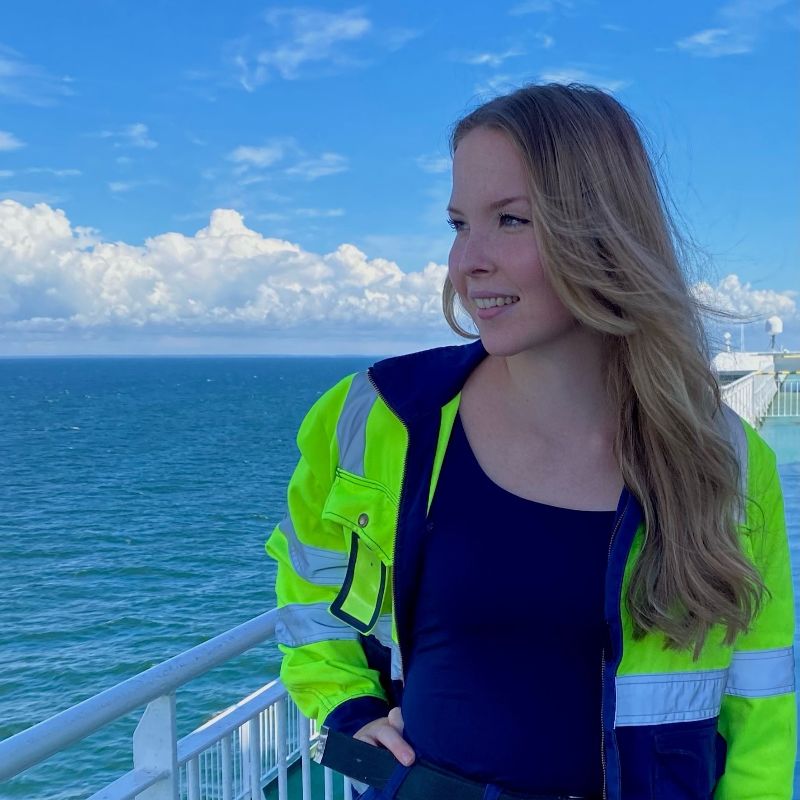Deck officer
"I ended up on the seas because I was interested. I’ve always been interested in doing something other than sitting in an office from eight to four. It’s often thought that people are going to work on the seas if they have seafarers in the family, but that’s not really the case."

- Suvi Keto
- Works in several shipping companies.
- Studying to become a sea captain at Satakunta University of Applied Sciences.
- Three years of work experience in the field.
Briefly explain what you do for a living.
I work as a deck officer on a cargo ship. On their watch, the deck officer pilots the vessel, that is, is responsible for the safe navigation of the ship at sea and supervises cargo loading and general safety in ports. In addition to watches both at sea and in port, a deck officer has other duties depending on the ship. These include the maintenance of maps, passage planning, taking care of rescue equipment, carrying out drills and medical treatment. A deck officer, like everyone else, also has safety duties that are practised regularly.
How have you ended up in the profession of your choice?
I ended up on the seas because I was interested. I’ve always been interested in doing something other than sitting in an office from eight to four. It’s often thought that people are going to work on the seas if they have seafarers in the family, but that’s not really the case.
I have completed the qualifications of a deck officer at a university of applied sciences, and I’m graduating as a sea captain in the spring. Becoming a deck officer directly through studies isn’t possible, as you must complete supervised on-board training in the deck department for at least 60 sea days in addition to the studies, after which you can work as an ordinary seafarer. A minimum of 360 sea days is required for the qualifications of a deck officer. I myself worked as an ordinary seafarer and an able seafarer a few years before I received the qualifications of a deck officer.
Describe your typical working day or week.
I work for four weeks, and then I have four weeks off. During those four weeks, the ship arrives at different ports every few days.
When the ship is at sea, the crew keeps watches. Watchkeeping means that I am responsible for the safe navigation of the ship on my watch. At the port, I supervise cargo loading and, for example, carry out inspections on the ship’s rescue equipment. In other words, the days can be roughly divided into two: sea days and port days. The deck officer also participates in the mooring and unmooring of the ship.
What kind of work environment or working hours do you have?
The work environment is constantly changing because ports and landscapes change. The ship’s deck officer is also responsible for piloting and navigating the ship at night. Typically, you have two 4–6-hour watches every day, between which you have 6–8 hours off.
What kind of competence or qualities are required in the profession?
If you want to work on a ship, you have to consider that you may be away from home for long stretches of time. On board a ship, you spend a lot of time with the same crew, so it’s important that you get along well with different kinds of people.
International maritime regulations require everyone to have the appropriate training for working on board ships. So, it’s impossible to get to work on the seas without any training or course in the field.
What is the best thing about your profession?
The best thing about working on board a ship is long holidays and the magnificent, changing scenery. Another bonus is that sometimes, if there is wiggle room in the schedule, you can visit the ports.
What are the downsides of the profession or what seems challenging?
The downside of the profession is long working hours, usually more than 10 hours a day, and the short night’s sleep you get due to that.
What would you tell a person considering the profession of a deck officer?
Just go for it if you’re interested! The work is quite diverse and very different compared to working on land. Various alternatives to working are not limited to Finland, but the possibilities to work abroad are very good, and there are a great many different kinds of vessels from private yachts to huge oil tankers.
How do you see the future of your profession?
Maritime transport always plays an important role in the Finnish economy and security of supply, so the sector isn’t disappearing. Unfortunately, labour costs are being increasingly reduced by, for example, weakening collective agreements. There is currently a shortage of deck officers.
